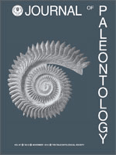
JOURNAL OF PALEONTOLOGY
metrics 2024
Unearthing the Secrets of Ancient Life
Introduction
JOURNAL OF PALEONTOLOGY, published by Cambridge University Press, is a leading scholarly journal dedicated to the field of paleontology, featuring a broad scope that covers fossil studies, evolutionary biology, and earth history. With an ISSN of 0022-3360 and an E-ISSN of 1937-2337, this esteemed journal serves as an essential platform for researchers, professionals, and students to disseminate cutting-edge research findings and insights in paleontological science. The journal holds a significant position within its category, ranking Q2 in the 2023 quartiles and achieving a Scopus rank of #51 out of 113 in Earth and Planetary Sciences – Paleontology, placing it in the 55th percentile of its field. Although it does not currently offer open access options, JOURNAL OF PALEONTOLOGY has been a critical contributor to advancing knowledge from its inception in 1979 through to 2024. Its dedication to rigorous research ensures it remains an indispensable resource for those vested in the understanding of ancient life and ecosystems.
Metrics 2024
 0.53
0.53 1.30
1.30 1.30
1.30 71
71Metrics History
Rank 2024
Scopus
IF (Web Of Science)
JCI (Web Of Science)
Quartile History
Similar Journals
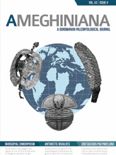
AMEGHINIANA
Connecting the Dots in Evolution and Ecological SystemsAMEGHINIANA is a distinguished academic journal published by the ASOCIACION PALEONTOLOGICA ARGENTINA, serving as a vital platform for the dissemination of cutting-edge research in the fields of Ecology, Evolution, Behavior and Systematics, as well as Paleontology. With its ISSN 0002-7014 and E-ISSN 1851-8044, the journal has established itself as a key reference point for scholars seeking to explore the intricate relationships within ecological systems and the evolutionary history of species. Despite not offering open access, AMEGHINIANA maintains a reputation bolstered by a Q3 ranking in both its subject categories, underlining its sustained commitment to enhancing scientific knowledge. Researchers and professionals alike benefit from this journal’s extensive archive of studies dating back to 1985, with ongoing contributions expected until 2024. With a focus on high-quality content, this journal is essential for anyone immersed in the study of paleobiology and ecological systems.

STRATIGRAPHY AND GEOLOGICAL CORRELATION
Innovating the Science of Stratigraphy and CorrelationSTRATIGRAPHY AND GEOLOGICAL CORRELATION is a prominent scholarly journal published by PLEIADES PUBLISHING INC, featuring a dedicated focus on the fields of geology, stratigraphy, and paleontology. With ISSN 0869-5938 and E-ISSN 1555-6263, this journal has been disseminating significant research findings since its inception in 1994, continuously contributing to the academic discourse through 2024. Despite not currently offering open access, its relevance is underscored by its Category Quartiles for 2023, where it has established itself as Q3 in Geology and Paleontology, and Q2 in Stratigraphy. STRATIGRAPHY AND GEOLOGICAL CORRELATION ranks #29 out of 55 in Stratigraphy and #186 out of 321 in Geology according to Scopus metrics, positioning it within the competitive landscape of Earth and Planetary Sciences. Researchers, professionals, and students are invited to engage with the journal’s content to deepen their understanding and foster innovation within these critical areas of study.
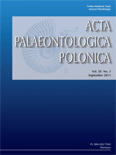
ACTA PALAEONTOLOGICA POLONICA
Unveiling the Mysteries of Life Through FossilsACTA PALAEONTOLOGICA POLONICA is a leading scholarly journal in the field of paleontology, published by the Institute of Paleobiology, Polish Academy of Sciences. With its open access model established since 1956, the journal ensures that vital research related to Earth's history and the evolution of life is freely accessible to a global audience. Based in Warsaw, Poland, this journal has garnered a respectable impact within the academic community, currently positioned in the Q2 quartile of its field and ranking #47 out of 113 in Scopus for Earth and Planetary Sciences, reflecting its significance in advancing paleontological research. Covering a wide range of topics related to fossil studies and evolutionary biology, ACTA PALAEONTOLOGICA POLONICA serves as a crucial platform for researchers, professionals, and students alike, encouraging the dissemination of innovative ideas and discussions that contribute to our understanding of past life on Earth. As it continues to publish high-quality articles through to 2024 and beyond, this journal remains integral to the ongoing discourse in paleontological sciences.

Fossil Record
Illuminating Earth's History, One Fossil at a TimeFossil Record is a prestigious open access journal pioneering the field of paleontology, published by Pensoft Publishers in Germany. Since its inception in 1998, it has provided a vital platform for the dissemination of groundbreaking research that advances our understanding of ancient life and environmental change through time. Holding an impressive Q2 quartile ranking in the field and securing a notable position among the top 73rd percentile of paleontological journals, Fossil Record ranks #31 out of 113 in the Scopus classification of Earth and Planetary Sciences. With a commitment to quality and accessibility, the journal not only encourages critical dialogue among researchers, professionals, and students but also promotes the sharing of knowledge worldwide. Explore its comprehensive repository of articles to stay abreast of the latest findings that shape our understanding of the planet’s history.

PALEONTOLOGICAL JOURNAL
Where Paleontology Meets Innovation.The PALEONTOLOGICAL JOURNAL, published by PLEIADES PUBLISHING INC, is a premier platform for the dissemination of research in the field of paleontology. With an ISSN of 0031-0301 and E-ISSN 1555-6174, this journal serves the academic community by providing insights into fossil studies, evolutionary biology, and the historical narrative of life on Earth. Despite being categorized in the Q3 quartile for 2023 and currently holding a Scopus rank of #84 out of 113 in the Earth and Planetary Sciences- Paleontology category, it remains a valuable resource for researchers and practitioners. The journal's coverage spans from 1990 to 2024, offering a comprehensive historical perspective while also addressing contemporary issues in paleological research. Scholars and students alike benefit from its rigorous peer-reviewed articles and the opportunity to access vital knowledge in the ever-evolving field of paleontology.
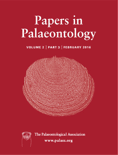
Papers in Palaeontology
Pioneering Insights into Evolutionary NarrativesPapers in Palaeontology, published by WILEY, is a premier academic journal dedicated to advancing the field of paleontology. With an admirable impact factor and positioned within the Q1 category in Paleontology for 2023, this journal has established itself as a leading platform for innovative research and discussion, ranking 17th out of 113 in Scopus’s Earth and Planetary Sciences category. Since its inception in 2015, Papers in Palaeontology has aimed to publish high-quality, peer-reviewed articles that explore the diversity of ancient life forms and their evolutionary history. Researchers, professionals, and students alike will find valuable insights and rigorous analyses that contribute to the understanding of our planet’s past. Although Open Access options are not available, the journal provides a wealth of knowledge essential for anyone engaged in the study or practice of paleontology, solidifying its importance in shaping future academic discourse.
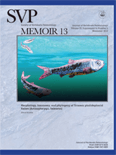
JOURNAL OF VERTEBRATE PALEONTOLOGY
Bridging Biology and Geology Through PaleontologyJOURNAL OF VERTEBRATE PALEONTOLOGY, published by Taylor & Francis Inc, is a premier academic journal dedicated to advancing the field of vertebrate paleontology. With a strong emphasis on both traditional and innovative research methods, this journal provides a platform for the dissemination of influential studies and discoveries that shape our understanding of vertebrate evolution and their ecological contexts. Operating under an ISSN of 0272-4634 and an E-ISSN of 1937-2809, it covers research published since 1981 and aims to foster a collaborative environment for researchers, professionals, and students alike. The journal is currently ranked in the Q2 category of Paleontology, standing at position #45 among 113 in its Scopus category, which underscores its significant contribution to the academic community. As a crucial resource for scholars, JOURNAL OF VERTEBRATE PALEONTOLOGY provides insights that not only enrich academic discourse but also stimulate further research and exploration in a field that bridges biology, geology, and conservation.

Palaeoworld
Bridging Past and Present: Insights from PalaeoworldPalaeoworld is a leading peer-reviewed journal published by ELSEVIER, focusing on the dynamic and interdisciplinary fields of paleontology, ecology, and stratigraphy. Established in 2006, the journal aims to facilitate the dissemination of innovative research and significant discoveries that enhance our understanding of past life on Earth. With an impressive impact factor and categorized in the second quartile (Q2) for Ecology, Evolution, Behavior and Systematics, Paleontology, and Stratigraphy in 2023, Palaeoworld stands out in its commitment to high-quality scholarship. The journal is indexed in Scopus, ranking #23 in Paleontology and #14 in Stratigraphy, placing it within the top 20% of publications in these categories. As a valuable resource for researchers, professionals, and students alike, it provides unrestricted access to cutting-edge findings, detailed methodologies, and critical assessments of paleo-environmental data. This journal is not only a repository of knowledge but also a platform for advancing discussions that bridge past ecological patterns with contemporary issues.
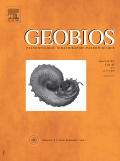
GEOBIOS
Pioneering Research for a Deeper Geological UnderstandingGEOBIOS is a prominent academic journal published by Elsevier France-Editions Scientifiques Medicales Elsevier, specializing in the fields of Paleontology, Space and Planetary Science, and Stratigraphy. With a rich publication history dating back to 1966, the journal aims to foster scholarly communication and dissemination of significant research findings among professionals and researchers in earth sciences. Recognized for its impact within the scientific community, GEOBIOS holds a respectable Q2 ranking in several categories, positioning it within the top tiers of scientific journals. Despite its traditional publication format, the journal provides a platform for groundbreaking studies that influence our understanding of both the geological past and future planetary developments. The journal's consistent ranking, including Rank #36 in Paleontology and Rank #59 in Space and Planetary Science, underscores its relevance and significance in its field. GEOBIOS serves as an essential resource for those engaged in the exploration of earth's history and its extraterrestrial counterparts, making it invaluable to researchers, students, and professionals alike.

PALAEONTOLOGIA ELECTRONICA
Connecting Researchers to the Rich Tapestry of Earth's HistoryPALAEONTOLOGIA ELECTRONICA is a distinguished open-access journal published by COQUINA PRESS, offering a vital platform for the dissemination of cutting-edge research in the fields of Paleontology and Oceanography. Launched in 1998, this journal has continuously fostered scholarly communication, allowing unrestricted access to scientific findings and contributing significantly to the advancement of the field. With an impressive track record since its inception, PALAEONTOLOGIA ELECTRONICA holds a 2023 Scopus ranking of #39 out of 113 in the Paleontology category, demonstrating its value among academic resources as evidenced by its Q2 quartile ranking. The journal is based in the United States, and it encourages submissions that span a diverse range of topics, from fossil analysis to evolutionary biology. As a prominent resource for researchers, educators, and students alike, it plays a crucial role in shaping the future of paleontological study.